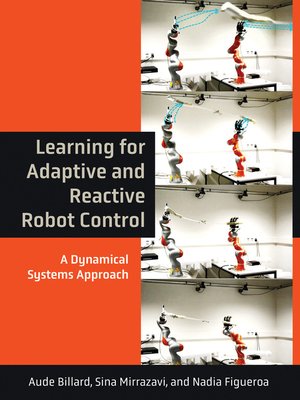Learning for Adaptive and Reactive Robot Control
ebook ∣ A Dynamical Systems Approach · Intelligent Robotics and Autonomous Agents
By Aude Billard

Sign up to save your library
With an OverDrive account, you can save your favorite libraries for at-a-glance information about availability. Find out more about OverDrive accounts.
Find this title in Libby, the library reading app by OverDrive.



Search for a digital library with this title
Title found at these libraries:
| Library Name | Distance |
|---|---|
| Loading... |
Methods by which robots can learn control laws that enable real-time reactivity using dynamical systems; with applications and exercises.
This book presents a wealth of machine learning techniques to make the control of robots more flexible and safe when interacting with humans. It introduces a set of control laws that enable reactivity using dynamical systems, a widely used method for solving motion-planning problems in robotics. These control approaches can replan in milliseconds to adapt to new environmental constraints and offer safe and compliant control of forces in contact. The techniques offer theoretical advantages, including convergence to a goal, non-penetration of obstacles, and passivity. The coverage of learning begins with low-level control parameters and progresses to higher-level competencies composed of combinations of skills.
Learning for Adaptive and Reactive Robot Control is designed for graduate-level courses in robotics, with chapters that proceed from fundamentals to more advanced content. Techniques covered include learning from demonstration, optimization, and reinforcement learning, and using dynamical systems in learning control laws, trajectory planning, and methods for compliant and force control .
Features for teaching in each chapter:
applications, which range from arm manipulators to whole-body control of humanoid robots; pencil-and-paper and programming exercises; lecture videos, slides, and MATLAB code examples available on the author’s website . an eTextbook platform website offering protected material[EPS2] for instructors including solutions.
This book presents a wealth of machine learning techniques to make the control of robots more flexible and safe when interacting with humans. It introduces a set of control laws that enable reactivity using dynamical systems, a widely used method for solving motion-planning problems in robotics. These control approaches can replan in milliseconds to adapt to new environmental constraints and offer safe and compliant control of forces in contact. The techniques offer theoretical advantages, including convergence to a goal, non-penetration of obstacles, and passivity. The coverage of learning begins with low-level control parameters and progresses to higher-level competencies composed of combinations of skills.
Learning for Adaptive and Reactive Robot Control is designed for graduate-level courses in robotics, with chapters that proceed from fundamentals to more advanced content. Techniques covered include learning from demonstration, optimization, and reinforcement learning, and using dynamical systems in learning control laws, trajectory planning, and methods for compliant and force control .
Features for teaching in each chapter:







